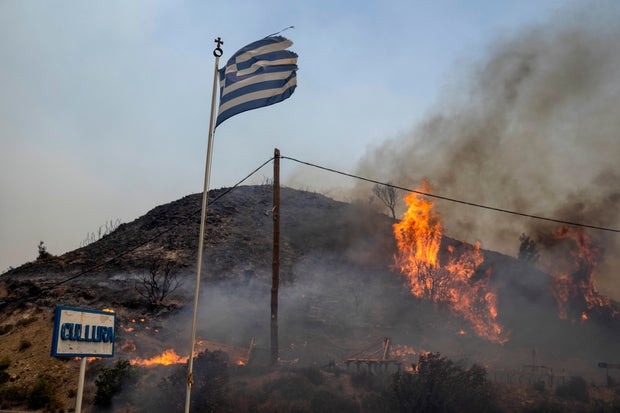Authorities scramble to carry out largest fire evacuations in Greece’s history: “We are at war”
A weeklong wildfire on the Greek resort island of Rhodes tore past defenses Monday, forcing more evacuations, as three major fires raged elsewhere in the country fueled by strong winds and successive heat waves that left scrubland and forests tinder-dry.
The latest evacuations were ordered in south Rhodes after 19,000 people, mostly tourists, were moved in buses and boats over the weekend out of the path of the fire that reached several coastal areas from nearby mountains. Authorities have called it the largest fire evacuation in Greece’s history. Another 2,500 people have been evacuated from the island of Corfu in response to fires there.
On Rhodes, a popular vacation spot and tourist destination, BBC News reporter Azadeh Moshiri shared an update on the wildfire response from the island’s airport on Monday, where, she said, many people were stuck after trying to evacuate.
“People here are extremely frustrated,” Moshiri said, describing a chaotic scene as people scrambled and struggled to secure flight arrangements out of the country.
Conflicting messages from officials on the state of the wildfires Monday heightened confusion over whether Rhodes was safe, Moshiri added, noting that fire authorities deemed the situation largely under control while the mayor said the opposite.
Greece is using an EU satellite service to estimate the damage caused by the fires and to target resources. Photographs published online by the service showed a brown hourglass-shaped burn scar across the middle of the island.
The army was also helping to set up temporary accommodation on Rhodes, where schools and sporting facilities were opened to help with the effort.
A relative respite from the heat on Monday, with highs of 100 degrees Fahrenheit, is to be followed by yet more high temperatures starting Tuesday. However, it should get significantly cooler on Thursday, with temperatures in the low- to mid-30s Celsius — roughly 85 to 95 degrees Fahrenheit — the country’s Meteorological Service said.
Firefighters across Greece on Monday were working to contain 82 wildfires burning around the country. Strong winds on Rhodes that were expected to increase throughout the day made containment on the island all the more challenging, BBC News correspondent Jenny Hill reported.
“We are at war -– completely focused on the fires,” Prime Minister Kyriakos Mitsotakis said during a debate in parliament. “Over the coming days and weeks, we must remain on constant alert.”
Petros Giannakouris / AP
Help continued to arrive from the European Union and elsewhere, with firefighting planes from neighboring Turkey joining the effort in Rhodes, where 10 water-dropping planes and 10 helicopters buzzed over flames up to 16 feet tall despite low visibility.
Ian Murison, a businessman from London who was on vacation with his wife and 12-year-old son in southern Rhodes, described his family’s ordeal as they tried to escape the fires on Saturday.
“We saw flames coming over the hills. Our hotel had capacity for 1,200, but there was just one coach waiting,” he said. “There was no process in place. … We all just took our cases and started walking, it was about 3 kilometers (nearly 2 miles) before we got out from underneath the ash cloud.”
The family reached a nearby beach, where they waited —in the dark due to a power blackout— with thousands of others to be evacuated by bus or boat.
“You could see an orange glow in the sky and it got more and more, big balls of fire going into the sky,” he said, describing chaotic scenes as evacuees crowded to board small boats arriving to take them off the beach.
“It didn’t matter if you had children, adults were fighting to get on next,” Murison said. “It was very, very stressful.”
Overnight, evacuations were also ordered on the western island of Corfu —where more than 2,000 people, including tourists, were moved to safety by land and sea— on the island of Evia and in a mountainous area in the southern Peloponnese region.
European Commission President Ursula von der Leyen contacted Prime Minister Mitsotakis late Sunday to offer additional assistance.
“I called (Prime Minister) Mitsotakis to express our full support for Greece, which is confronted with devastating forest fires and a heavy heat wave due to climate change,” she wrote in a tweet.
Addressing parliament, Mitsotakis also highlighted the threat from climate change, which he said “will make its presence ever more felt with greater natural disasters throughout the Mediterranean region.”
The fire service was investigating the causes of the blazes, which raged as 50 new wildfires on average have been breaking out daily for the past twelve days, according to government spokesperson Pavlos Marinakis. On Sunday alone, 64 new blazes were recorded.
On Rhodes, the fire roared down mountain slopes, burning homes and cars and leaving livestock dead on the roadside as they tried to escape.
Authorities said no serious injuries were reported in the evacuations, but hospitals and health volunteers provided first aid to tourists and others, mostly for the effects of heat and dehydration.
Several airlines, including easyJet and package operator Tui, sent planes to Rhodes to evacuate tourists forced from hotels by the wildfire. The U.K. government said between 7,000 and 10,000 British nationals are on the island, a popular package holiday destination.
Some tourists said travel companies had failed to provide information or help.
Rhodes is visited by about 2.5 million tourists each year and is one of Greece’s most popular holiday destinations. As some visitors continued to flee the island Monday, others were arriving from multiple European destinations to start their holidays at resorts not affected by the wildfire —some 90% of the total, according to Greek authorities.
For all the latest World News Click Here
For the latest news and updates, follow us on Google News.


